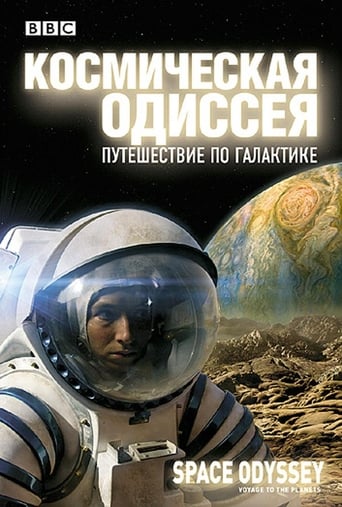Carlos Barton
When I look back at sci-fi documentaries of the last decade, I often think of this BBC-produced two-parter from 2004, about a cluster of astronauts setting off on, in their universe, the greatest exploration mission in human history, a trip to the edge of the solar system on the mile-long, nuclear-powered Pegasus. They encounter the infinite wonders of out region of space, landing on Mars and Venus, inspecting the rings of Saturn. The astronauts even go to the surface of Pluto (VTTP was made before it was demoted from planet status)! The journey gets inevitably sad in some places, with the loss of several probes and one of the astronauts to lymphoma.But what makes the program so special is that it tries to be as realistic as possible, with endlessly fascinating info being exchanged with the viewers along the way and manages to add the dangers of space travel e.g. debris, radiation sickness, yet without making the whole thing feel so depressing.The CGI used by the BBC plus the narration of David Suchet aka. Poirot can only add to the outstanding quality of VTTP and the John Williams-esque music, especially that used for the intro, is mindblowing to listen to against the images of the planets. In some people it will shed tears. So will this documentary. An underrated masterpiece of science- fiction that would leave Arthur C Clarke grinning from ear to ear if he were here to see it.
Chilla Black
ten years from its own genesis...'voyage to the planets' still looks as good as it did back in 2004. At that time I actually caught it on TV by sheer accident and for about 15 minutes actually thought it was a real event....as in a space version of Big Brother - in those days anything seemed possible.So, this is a great space documentary that serves its purpose as being good eye candy but also informative. As a person who has always wanted to go to Pluto, I was delighted to see what the surface of the last unchartered area of our galaxy looks like - all thanks to the BBC. Likewise, the landing on Venus was jaw dropping to watch at that moment in time. The view of Jupiter from Io, also devilishly spectacular!However, the biggest thumbs up for this documentary is that after 10 years it sill looks good and still feels as good to watch, CGI hasn't dated it yet. It is also has a good quality running time which is great for sitting back, slow-motion tossing popcorn and squirting orange juice while pretending you and your buddies are in zero gravity. The DVD release is also a 2 part set which follows the same format as the original TV showing. Cool.
DUCK_of_DEATH
Jeez, It's been nearly 40 years since we landed on the moon, even so, the people who made this "documentary" still managed to forget that other planets are a *long* way off--so long that light takes time to travel between here and there. It takes light (and radio communications) 1.5 seconds just to get from the Moon to the Earth, 2 minutes from Venus, 4 minutes from Mars, 36 from Jupiter, and a whopping 72 minutes from Saturn. Yet Mission Control was watching and managing everything in real-time. Wrong, wrong, wrong! The whole premise for this flick was flawed, didn't anyone take physics in high school? How could the science advisor's have made such a huge mistake??!!! Waste of good special effects budget. Better luck next time, BBC.
Skaffen-Amtiskaw
Despite missing the first episode and having to frantically find out when the repeat was on, I was not disappointed having to wait a little longer to see this mini-series on viable space exploration today or in the near future.As with the BBC's other "Walking With...", "Seven Wonders Of The Industrial World" series and Space ("Hyperspace" to US viewers), this is a well scripted, CGI and fact filled venture played out to the tune of a fictional mission to visit the major planets of our solar system: Sol.From visiting Mars to a slingshot manoeuvre around the Sun and a tricky landing on a passing comet, this highlights what information we could well be finding if an international effort to make such a mission comes about.I hope this comes out on DVD (and not limited to, say, Australian DVD as with the equally amazing "Seven Wonders Of The Industrial World") as the accompanying book cannot do full justice to what a great insight this two-parter is to our corner of the universe. I'm certain beginners in astronomy and experts in the field will find this an enjoyable feature. The music by Don Davis (as with the previous mentioned series) is ideally epic and moving and the screenplay by Joe Ahearne makes the characters believable and adds suspense. This is far from a simple lesson on the planets you'd get at school.


